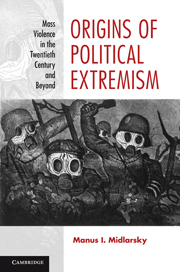5 - Communism
Published online by Cambridge University Press: 05 June 2012
Summary
This chapter examines the etiology of communism as it evolved in Russia both before the Bolshevik Revolution and thereafter; it later emphasizes the genesis of Stalinist extremism. In contrast to fascism's, especially Nazism's, departure from European (Western) political traditions, communism will be seen to emerge from native ideational roots, especially as it was evolving among the intelligentsia. Tsarist authority space was contracting slowly during the nineteenth century, well before the defeat by Japan in 1905 was to accelerate this process. As we shall see, the impact of this defeat on Stalin was to be consequential for his later extremism. Indeed, Stalin's entire personal development as a Bolshevik revolutionary is crucial to understanding the formation of his later extremist policies.
Because the Soviet, especially Stalinist template, was so important for later communist developments in, say, China or Cambodia, this initial communist model will be emphasized. For example, according to Vojtech Mastny, a prescient observer of the communist scene, “There cannot be a doubt that Mao Zedong on his first visit to Moscow treated Stalin as the supreme authority of world communism, with a reverence that was not merely pretended but rooted in a perception of common interests, to which the Chinese leader repeatedly and cogently alluded.” Russia also is unique in being the crucible both for the formation of proto-fascism, as we saw in the preceding chapter, and Bolshevism, which would later evolve into communist and Stalinist extremism.
- Type
- Chapter
- Information
- Origins of Political ExtremismMass Violence in the Twentieth Century and Beyond, pp. 115 - 140Publisher: Cambridge University PressPrint publication year: 2011

